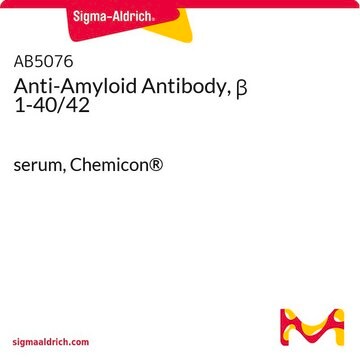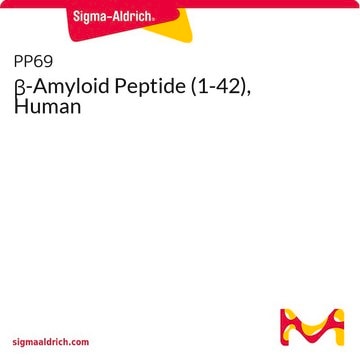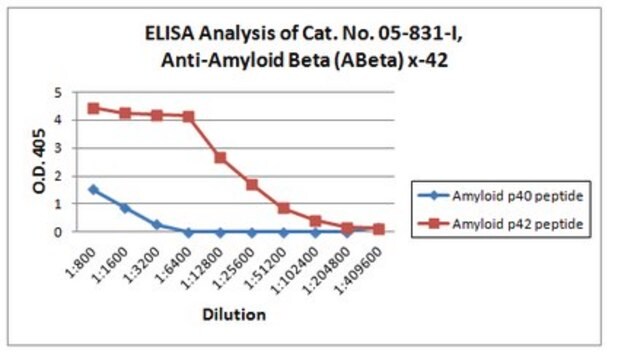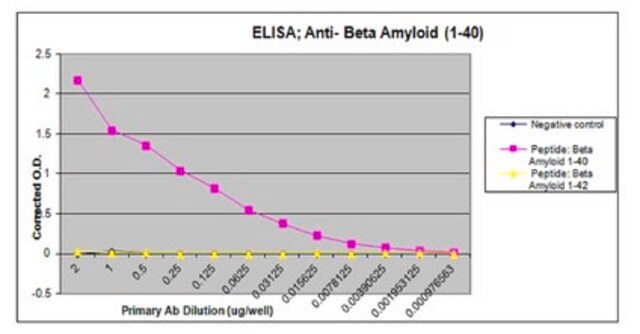AB1510
Anti-Amyloid β Antibody, aa1-14 h β-amyloid
serum, Chemicon®
Synonym(s):
Beta-APP, A-beta
Sign Into View Organizational & Contract Pricing
All Photos(1)
About This Item
UNSPSC Code:
12352203
eCl@ss:
32160702
NACRES:
NA.41
Recommended Products
biological source
rabbit
Quality Level
antibody form
serum
antibody product type
primary antibodies
clone
polyclonal
species reactivity
human
manufacturer/tradename
Chemicon®
technique(s)
immunohistochemistry: suitable
western blot: suitable
NCBI accession no.
UniProt accession no.
shipped in
dry ice
target post-translational modification
unmodified
Gene Information
human ... APP(351)
Specificity
Beta amyloid. Sequence is contained in the Amyloid beta-A4 protein amino acids 672-685 of human APP. The sequence is identical in the following other related proteins:
Cerebral vascular amyloid peptide) (CVAP) (Protease nexin-II) (PN-II) (APPI) (PreA4) [Contains: Soluble APP-alpha (S-APP-alpha); Soluble APP-beta (S-APP-beta); C99; Beta-amyloid protein 42 (Beta-APP42); Beta-amyloid protein 40 (Beta-APP40); C83; P3(42); P3(40); Gamma-CTF(59) (Gamma-secretase C-terminal fragment 59) (Amyloid intracellular domain 59) (AID(59)); Gamma-CTF(57) (Gamma-secretase C-terminal fragment 57).
100% homology in human, pig, sheep, rabbit, bovine, 78% identities (11/14), with 12/14 positives (85%) in rat and mouse beta amyloid containing proteins.
Cerebral vascular amyloid peptide) (CVAP) (Protease nexin-II) (PN-II) (APPI) (PreA4) [Contains: Soluble APP-alpha (S-APP-alpha); Soluble APP-beta (S-APP-beta); C99; Beta-amyloid protein 42 (Beta-APP42); Beta-amyloid protein 40 (Beta-APP40); C83; P3(42); P3(40); Gamma-CTF(59) (Gamma-secretase C-terminal fragment 59) (Amyloid intracellular domain 59) (AID(59)); Gamma-CTF(57) (Gamma-secretase C-terminal fragment 57).
100% homology in human, pig, sheep, rabbit, bovine, 78% identities (11/14), with 12/14 positives (85%) in rat and mouse beta amyloid containing proteins.
Immunogen
Epitope: aa1-14 h beta-amyloid
Synthetic peptide that corresponds to the first 14 amino acids of the N-terminal sequence of beta-amyloid. {DAEFRHDSGYEVHH}
Application
Anti-Amyloid Antibody, β, aa1-14 h β-amyloid detects level of Amyloid & has been published & validated for use in WB, IH.
Immunohistochemistry on formic acid treated histological sections. Suggested working dilution is >1:200. AB1510 will detect both cerebrovascular and core amyloid. Formic acid pretreatment (Vinters et al., 1988) involves deparaffinizing sections, follwed by incubation in a 99% formic acid solution (10-20 min), a tap water rinse (10 min), 0.3% H202 in tris-buffered saline, then 3.0% NGS (30 min) followed by primary antibody.
Immunoblotting of formic acid extracts of brain tissue.
ELISA, direct:≥ 1:1000
Optimal working dilutions must be determined by end user.
Immunoblotting of formic acid extracts of brain tissue.
ELISA, direct:≥ 1:1000
Optimal working dilutions must be determined by end user.
Research Category
Neuroscience
Neuroscience
Research Sub Category
Neurodegenerative Diseases
Neurodegenerative Diseases
Physical form
Rabbit serum with 0.01% thimerosal.
Storage and Stability
Maintain at -20°C in undiluted aliquots for up to 12 months after date of receipt. Avoid repeated freeze/thaw cycles.
Legal Information
CHEMICON is a registered trademark of Merck KGaA, Darmstadt, Germany
Disclaimer
Unless otherwise stated in our catalog or other company documentation accompanying the product(s), our products are intended for research use only and are not to be used for any other purpose, which includes but is not limited to, unauthorized commercial uses, in vitro diagnostic uses, ex vivo or in vivo therapeutic uses or any type of consumption or application to humans or animals.
Not finding the right product?
Try our Product Selector Tool.
Storage Class Code
12 - Non Combustible Liquids
WGK
WGK 1
Flash Point(F)
Not applicable
Flash Point(C)
Not applicable
Certificates of Analysis (COA)
Search for Certificates of Analysis (COA) by entering the products Lot/Batch Number. Lot and Batch Numbers can be found on a product’s label following the words ‘Lot’ or ‘Batch’.
Already Own This Product?
Find documentation for the products that you have recently purchased in the Document Library.
Tatiana Melnikova et al.
The Journal of neuroscience : the official journal of the Society for Neuroscience, 33(9), 3765-3779 (2013-03-01)
Transgenic mice that express mutant amyloid precursor protein (APPsi) using tet-Off vector systems provide an alternative model for assessing short- and long-term effects of Aβ-targeting therapies on phenotypes related to the deposition of Alzheimer-type amyloid. Here we use such a
Masataka Nakamura et al.
American journal of neurodegenerative disease, 3(2), 93-102 (2014-09-19)
Optineurin (OPTN) is a multifunctional protein involved in cellular morphogenesis, vesicle trafficking, maintenance of the Golgi complex, and transcription activation through its interactions with the Rab8, myosin 6 (MYO6), huntingtin. Recently, OPTN immunoreactivity has been reported in intranuclear inclusions in
Our team of scientists has experience in all areas of research including Life Science, Material Science, Chemical Synthesis, Chromatography, Analytical and many others.
Contact Technical Service








